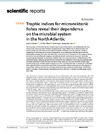Please use this identifier to cite or link to this item:
https://accedacris.ulpgc.es/jspui/handle/10553/106937
| DC Field | Value | Language |
|---|---|---|
| dc.contributor.author | Bode Riestra,Antonio | - |
| dc.contributor.author | Olivar, M. Pilar | - |
| dc.contributor.author | Hernández León, Santiago Manuel | - |
| dc.date.accessioned | 2021-04-21T12:09:26Z | - |
| dc.date.available | 2021-04-21T12:09:26Z | - |
| dc.date.issued | 2021 | - |
| dc.identifier.issn | 2045-2322 | - |
| dc.identifier.other | Scopus | - |
| dc.identifier.uri | https://accedacris.ulpgc.es/handle/10553/106937 | - |
| dc.description.abstract | The importance of microbes for the functioning of oceanic food webs is well established, but their relevance for top consumers is still poorly appreciated. Large differences in individual size, and consequently in growth rates and the relevant spatial and temporal scales involved, make the integration of microorganisms and large metazoans in a common food web framework difficult. Using stable isotopes, this study estimated the trophic position of 13 species of micronektonic fishes to examine the microbial and metazoan contribution to mid trophic level consumers. Vertically migrant species displayed higher trophic positions than non-migrant species in all depth layers. The estimated trophic positions agreed well with those from the literature, but all species displayed mean increases between 0.5 and 0.8 trophic positions when taking into account microbial trophic steps. Trophic position, but not the relative importance of the microbial food web, increased with individual size, suggesting that current estimates of the trophic position of top consumers and of the length of oceanic food webs are too low because they are based only on metazoan trophic steps. This finding calls for a review of trophic position estimates and of the efficiency of trophic transfers along oceanic food webs | - |
| dc.language | eng | - |
| dc.relation | Biomasa y Flujo Activo en la Zona Batipelágica | - |
| dc.relation | Sustainable management of mesopelagic resources | - |
| dc.relation | Tropical and South Atlantic - climate-based marine ecosystem prediction for sustainable management | - |
| dc.relation.ispartof | Scientific Reports | - |
| dc.source | Scientific Reports [ISSN 2045-2322], n. 11, 8488, (Abril 2021) | - |
| dc.subject | 251001 Oceanografía biológica | - |
| dc.title | Trophic indices for micronektonic fishes reveal their dependence on the microbial system in the North Atlantic | - |
| dc.type | info:eu-repo/semantics/Article | - |
| dc.type | article | - |
| dc.identifier.doi | 10.1038/s41598-021-87767-x | - |
| dc.identifier.scopus | 85104498923 | - |
| dc.contributor.authorscopusid | 7101850601 | - |
| dc.contributor.authorscopusid | 6701404333 | - |
| dc.contributor.authorscopusid | 6701465678 | - |
| dc.identifier.eissn | 2045-2322 | - |
| dc.identifier.issue | 1 | - |
| dc.relation.volume | 11 | - |
| dc.investigacion | Ciencias | - |
| dc.type2 | Artículo | - |
| dc.description.numberofpages | 10 | - |
| dc.utils.revision | Sí | - |
| dc.date.coverdate | Diciembre 2021 | - |
| dc.identifier.ulpgc | Sí | - |
| dc.contributor.buulpgc | BU-BAS | - |
| dc.description.sjr | 1,005 | |
| dc.description.jcr | 4,996 | |
| dc.description.sjrq | Q1 | |
| dc.description.jcrq | Q2 | |
| dc.description.scie | SCIE | |
| dc.description.miaricds | 10,5 | |
| item.fulltext | Con texto completo | - |
| item.grantfulltext | open | - |
| crisitem.author.dept | GIR IOCAG: Oceanografía Biológica y Cambio Global | - |
| crisitem.author.dept | IU de Oceanografía y Cambio Global | - |
| crisitem.author.dept | Departamento de Biología | - |
| crisitem.author.orcid | 0000-0002-3085-4969 | - |
| crisitem.author.parentorg | IU de Oceanografía y Cambio Global | - |
| crisitem.author.fullName | Bode Riestra,Antonio | - |
| crisitem.author.fullName | Hernández León, Santiago Manuel | - |
| crisitem.project.principalinvestigator | Hernández León, Santiago Manuel | - |
| crisitem.project.principalinvestigator | Hernández León, Santiago Manuel | - |
| crisitem.project.principalinvestigator | Hernández León, Santiago Manuel | - |
| Appears in Collections: | Artículos | |
SCOPUSTM
Citations
22
checked on Jun 8, 2025
WEB OF SCIENCETM
Citations
24
checked on Jan 25, 2026
Page view(s)
71
checked on Jan 11, 2026
Download(s)
48
checked on Jan 11, 2026
Google ScholarTM
Check
Altmetric
Share
Export metadata
Items in accedaCRIS are protected by copyright, with all rights reserved, unless otherwise indicated.
